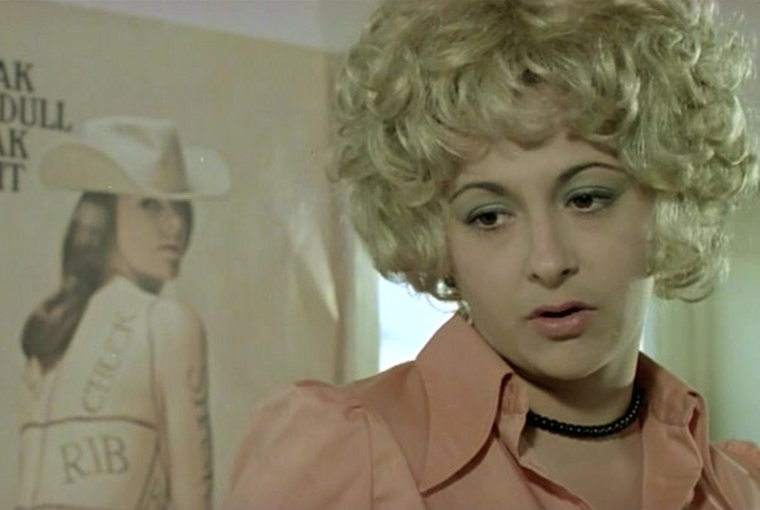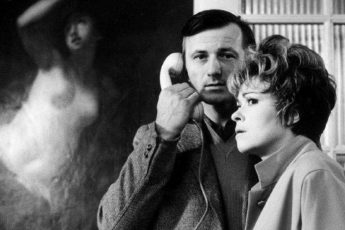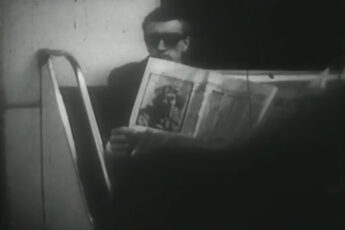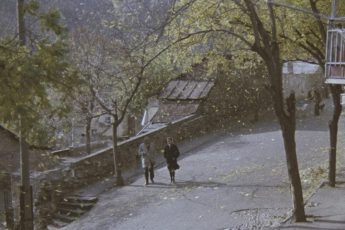Unholy Rodeo
Goran Paskaljević’s The Dog Who Loved Trains (Pas koji je voleo vozove, 1977)
Vol. 20 (August 2012) by Konstanty Kuzma
Paskaljević’s film starts out on board of a prison train: tired of the relentless heat in the train cabins, a group of lighthearted female prisoners decide to take their clothes off. The disorder caused by this collective striptease allows two prisoners to jump off the train and escape, one of them being our protagonist Mika, a middle-aged woman with short hair and a confident walk. Trying to escape the police, Mika loses her companion and joins Rodolyub “Rodney” Alexich, an ex-stuntman and wanna-be John Wayne who makes a living with live rodeo performances. Alexich promises his audiences a performance with scenes taken from over 50 productions (from A Fistfull of Dollars to Old Shatterhand), his stunts ranging from versatile horse tricks to a man-donkey fight. Though Alexich knows Mika is a run-off, he hopes that she can compensate for his lack of “tits, breasts and curves“ (traits that will also come in handy off stage). Alexich also chooses a third companion (an unnamed young man eager to retrieve his lost dog ‘Ding’), thus completing the ill-matched circus ensemble. The odd man seems useless to Alexich at first, but soon finds his place in the story when he warns Mika that Alexich wants to turn her in to the police…
Surely, Mika’s character resembles that of innocent Gesolmina (La Strada) or the virginlike Cabiria from Nights of Cabiria and The White Shriek, Bojkovic’s short hair and vivid nature doing little to conceal her striking resemblance to Giuletta Masina. But even more than Masina’s characters, Mika is a doer, someone who takes her faith into her own hands. While Paskaljević’s film can also be considered a road movie of some sort, Mika’s road is quite different from that of Gesolmina: where Gesolmina meets the tyranny of her boss with holy passivity, Mika flees – first from the police, then from Alexich, and finally from the helping hands of Ding’s owner (in the case of Ding’s owner, this distrust has fatal consequences). Ironically, it is Alexich himself who warns Mika not to trust anybody. Still, Alexich is a hypocrit, not a liar. He does believe it is him that is being exploited by “them”, and thus right in saying that Mika should not trust anybody. For Alexich, this is the only way to survive. “If you want to take people’s money, you have to do everything better than they can,” Alexich tells Ding’s owner. What he doesn’t tell him is that this also goes for dishonesty. Alexich’s logic is a perfect reconstruction of the logic of the ordinary communist felon: ‘if “they” are doing it, I may also do it.’ Where Mika flees, Alexich reproduces (and indeed, it would be nice if contemporary Balkan directors could be more like Mika, and less like Alexich).
Shot in 1977, Paskaljević’s film is not just an ode to humanity, but likewise a solemn picture of a crumbling country. In the 1980’s, Tito’s Yugoslavia would reach another lowpoint before the 1990s with inflation and unemployment peeking at record lows; after 1983, the International Monetary Fund stops Yugoslavia’s uncoordinated borrowing from foreign governments. Undoubtedly, this disastrous economic situation bleeds into the screen, but it is a notable strength of Paskaljević not to approach reality as an agenda. In a good film, reality will bleed in itself…




Leave a Comment